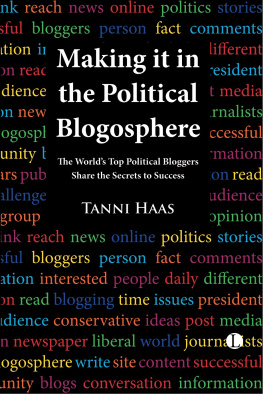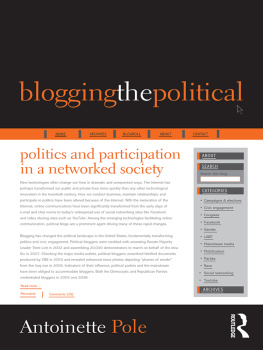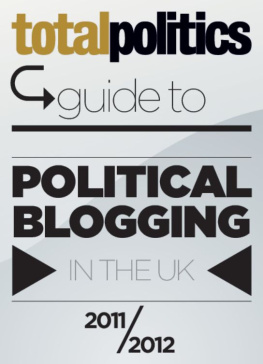Introduction: The Rise and Influence of the Political Blogging A-list
While the technology behind blogs has been around since the early 1990s, blogging became increasingly popular in the late 1990s with the introduction of freely available and user-friendly software like Blogger , LiveJournal , and Weblogger .
The 1.3 million political bloggers, of whom the vast majority are ordinary people with a passion for politics, use their blogs to report original news from events theyve personally witnessed, analyze and comment on the reporting by mainstream news media, and champion their own political causes. Political bloggers often encourage their readers to support particular political candidates and parties, by featuring political ads, soliciting campaign contributions, circulating online petitions, and posting information about upcoming rallies and votes.
The incredible growth in political blog writing is mirrored in the number of people who read them. While an impressive 44% of all Americans have read political blogs,
The influence of political blogs reaches far beyond their immediate readership. Political blog readers tend to be politically active individuals who engage others in online and interactive conversations about what theyve read, thereby serving as opinion-leaders for countless other people.
Even more significant than the sheer number of people who read and are influenced by political blogs is the importance people attach to them. Studies have found that political blog readers consider such blogs more trustworthy sources of information than they do any other mainstream news media, including online and offline newspapers, television, and radio. Political blogs are considered more trustworthy because they provide access to a broader spectrum of issues than is available in the mainstream news media; cover those issues in greater depth, with more independence and points of view; and present them in a manner thats more understandable and relevant to readers.
The Stature and Influence of the Political Blogging A-List
While more than a million people have political blogs, a select few wield enormous influence within the political blogosphere and in politics. Variously referred to as the political blogging A-list, these bloggers attract the majority of political blog readers, set the agenda for the many smaller blogs, are widely read by mainstream journalists and, as I describe in the next section, exert a strong impact on politics.
Political blog readership isnt evenly distributed as the top blogs attract most of the readers. One study revealed that the top 10 blogs account for 48% of readers. The 20 bloggers featured in this book, all of whom belong to the political blogging A-list, have a combined daily audience of 23 million readers.
The top blogs arent only read by a large and ever growing audience; they also influence what the rest of the political blogosphere blogs about. This becomes clear when one considers how political bloggers link to one another. If there were no agenda-setters in the political blogosphere, all political blogs would have roughly the same number of incoming links from other blogs. Yet, research shows, a few top blogs receive the bulk of incoming links. A study of more than 400 political blogs found that, while the top 12 blogs attracted 20% of all incoming blog links, the top 50 blogs attracted 50% of all such links.
The influence of the top blogs goes beyond the mass of smaller blogs. Mainstream journalists political reporters and columnists in particular regularly read political blogs, often several blogs daily. They do so to gather ideas for future stories, hear whats being said in the political blogosphere about their reporting, and to gauge public reactions to major news events.
But journalists dont just read any political blog they happen to encounter. Like political blog readers, their reading is also focused on a few top blogs. A study of 140 journalists employed by national and local news organizations in the U.S. found that the ten most widely read blogs accounted for 54% of those mentioned. Among journalists working for national news organizations, this bias was even more pronounced: the ten most widely read blogs accounted for almost 75% of those mentioned.
Journalists blog reading behavior is quite logical. Since the top blogs attract the majority of political blog readers, and set the agenda for countless smaller blogs, journalists only need to read these blogs to get a relatively accurate impression of public (and blogger) opinion with respect to certain issues.
The Political Blogging A-lists Impact on Politics
Most impressively, there are many examples of how top political bloggers have had an impact on politics, either indirectly through their influence on mainstream journalists or directly through their blogging.
The first and most widely cited incident of political blogger influence has become known as the Trent Lott affair (or Lottgate.) On December 5, 2002, a large number of political dignitaries were gathered in the Dirksen Senate Office Building to celebrate Senator Strom Thurmonds (R-SC) one hundred birthday. Many of Thurmonds Republican colleagues spoke, praising the Senates longest-serving member for his many accomplishments over a long career. But one of Thurmonds colleagues, Senate Majority Leader Trent Lott (R-MS), went one step further. During his remarks, Lott said that his home state of Mississippi was proud to have voted for Thurmond when, in 1948, hed run for president as a third-party candidate on a segregationist platform: I want to say this about my state: When Strom Thurmond ran for president, we voted for him. Were proud of it. And if the rest of the country had followed our lead, we wouldnt have had all these problems over all these years.
Although Lotts controversial remarks were broadcast live on C-SPAN , they elicited no reactions among the many mainstream journalists who covered the event. In fact, none of the major television networks mentioned his remarks on the prime-time news shows that evening, nor did the major newspapers the next day.
It was only after Lotts remarks were heavily criticized by several top conservative and liberal bloggers, who also called for his resignation, that the mainstream news media began to take notice. On December 10, or fully five days after the event, the New York Times covered the story for the first time, and each of the nightly network news shows discussed Lotts remarks.
As the story continued to grow, and more political bloggers and mainstream journalists started to cover it, insisting that Lott be held accountable for his remarks, both the White House and other Republican senators began to distance themselves from Lott who, under considerable party pressure, resigned his position as Senate Majority Leader on December 20. The political blogging A-lists ability to force the story into the mainstream news, which ultimately forced Lott to relinquish his leadership position, led one noted observer to call the Trent Lott affair the Internets first scalp.













